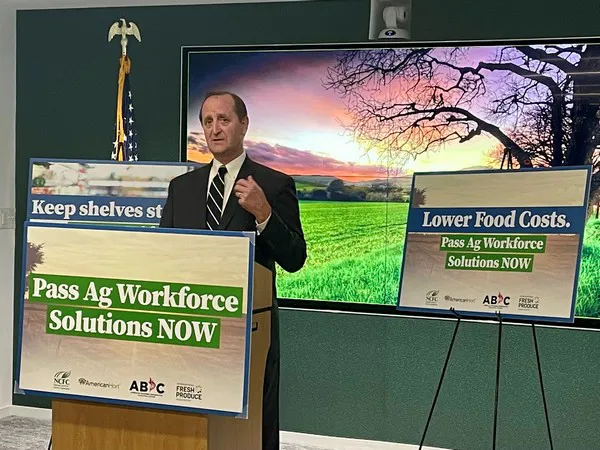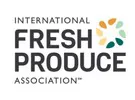The International Fresh Produce Association (IFPA) stood with Congressional and agriculture industry leaders last week to demand Senate action on immigration reform.
IFPA CEO Cathy Burns joined U.S. Representatives Mike Simpson (R-ID) and Dan Newhouse (R-WA), as well as the National Council of Farmer Cooperatives, U.S. Apple, and others at a press conference led by the American Business Immigration Coalition Action (ABIC Action) calling for passage of the Farm Workforce Modernization Act.
In 2021, the U.S. House of Representatives passed the Farm Workforce Modernization Act with bipartisan support. In the Senate, Senators Mike Crapo (R-ID) and Mike Bennet (D-CO) have taken the lead in negotiating improvements on the House's solutions and moving the process forward. Passing new Senate legislation is critical to solving labor shortages facing the agriculture sector and sustaining the U.S. economy as a whole.
 The U.S. Apple Association's Jim Bair.
The U.S. Apple Association's Jim Bair.
The bill provides legal status for the current agricultural workforce, reforms the current federal agriculture guest worker program known as H-2A, and ensures access to a skilled, dedicated workforce.
"Immigration reform is the single most important action that can be taken to give relief to Americans struggling to fight unprecedented food inflation and provide healthy food choices for their families," said Burns.
IFPA members from around the country will be in D.C. September 26-28 for the association's Washington Conference and to meet with congressional leaders to make a case for immigration reform, among other priorities.
The U.S. Apple Association's Jim Bair, president, and CEO of U.S. apple, also spoke out. "Increasingly, apple growers are turning to the H-2A guestworker program, and today, apples are probably the largest single commodity user of the program. But workers are often delayed due to administrative red tape, and the costs associated with the program have outpaced inflation for decades."
"The reforms in the House-passed Farm Workforce Modernization Act would bring stability and predictability to the agriculture labor market as a whole and specifically to the H-2A program. Growers would know what their labor costs are for the year and could plan accordingly, instead of scrambling when they learn at the last minute the H-2A wage rate is increasing by 10 percent or more."
"We implore the Senate leadership to put politics aside for the sake of food security and the economic viability of our rural communities."
"The past few years, growers' input costs such as fuel, fertilizer, and freight have risen as much as 300 percent, while lost export markets have left apples to overhang the market. Apple growers are making tough decisions to determine if they can continue producing fruit for another year, or if what has been a livelihood for three, four or more generations stops with them," said Bair.
 For more information:
For more information:
Siobhan May
IFPA
Tel: +1 (302) 781-5855
[email protected]
www.freshproduce.com
Tracy Grondine
U.S. Apple Association Tel: +1 (703) 442-8850
Tel: +1 (703) 442-8850
[email protected]
www.usapple.org
